Present tense- Irregular verbs
In this video, I explain the Spanish present tense starting from the basics, how to create and use the irregular verbs.
We go over how to conjugate irregular verbs in the present tense, practice with exercises, and finish by learning how to form common phrases in Spanish you’ll use in daily life.
Explicación de formación de verbos irregulares
Explanation of how to form irregular verbs
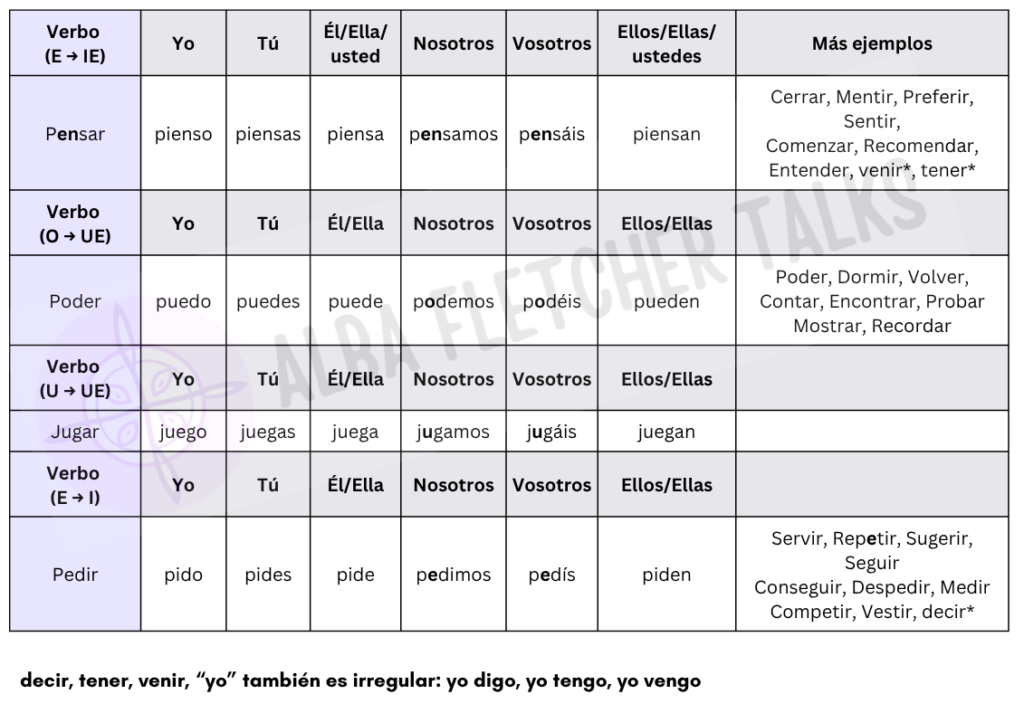
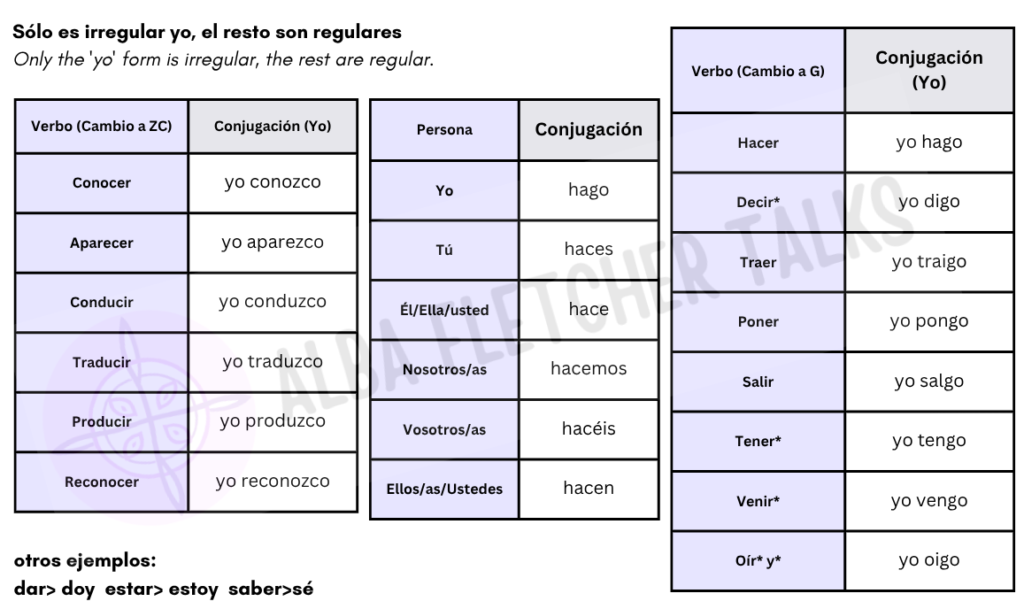
Grammar
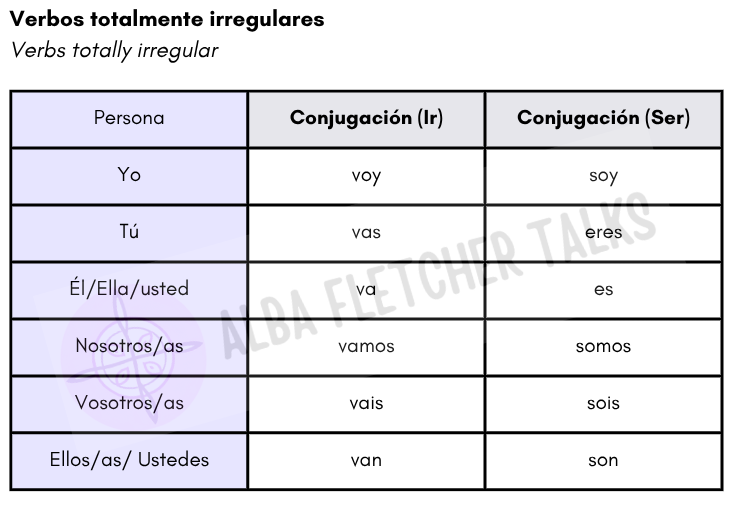
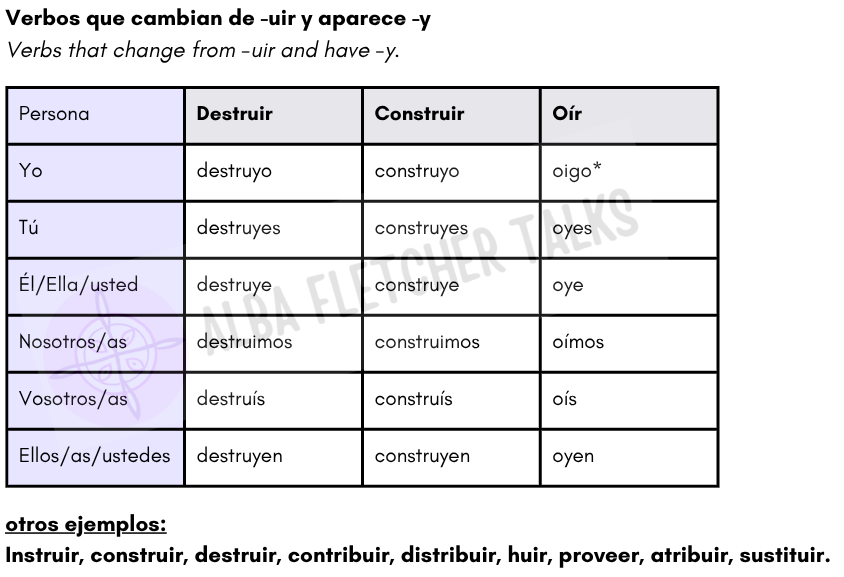
POR FAVOR, son muchos. Aprende SÓLO los más utilizados. Vamos a hacer ejercicios después con los más útiles.
NO es necesario aprender TODOS. Se aprenden con el tiempo.
PLEASE, there are many. Learn ONLY the most used ones. We will do exercises later with the most useful ones.
It is not necessary to learn ALL of them. You will learn them over time
Exercises
Vamos a practicar los verbos regulares completando las frases.
INTENTA TRADUCIR cada frase antes de completar para aprender al mismo tiempo vocabulario y estructura
Let’s practice regular verbs by completing the sentences.
TRY TO TRANSLATE each sentence before completing it to learn vocabulary and structure at the same time.
- Yo siempre __________ (ir) al trabajo en bicicleta. I always go to work by bicycle.
- Tú __________ (tener) muchas cosas que hacer hoy. You have many things to do today.
- Nosotros __________ (hacer) ejercicio por la mañana. We do exercise in the morning.
- Ellos __________ (poder) estudiar en la biblioteca. They can study in the library.
- Yo __________ (estar) cansado después de trabajar. I am tired after working.
- ¿Tú __________ (ser) estudiante de español? Are you a Spanish student?
- Yo __________ (decir) lo que pienso siempre. I say what I always think.
- Ellos __________ (salir) a cenar el viernes. They go out for dinner on Friday.
- Yo __________ (traer) mi comida al trabajo. I bring my food to work.
- Tú __________ (jugar) al fútbol todos los sábados. You play football every Saturday
Respuestas
1. voy 2. tienes 3. hacemos 4. pueden 5. estoy 6. eres 7. digo 8. salen 9. traigo 10. juegas
Si quieres más ejercicio para practicar las estructuras, haz click en el enlace abajo.
RECUERDA: intenta traducir las frases para entenderlas y aprender nuevo vocabulario y estructura.
If you want more exercises to practice the structures, click on the link below.
REMEMBER: try to translate the sentences to understand them and learn new vocabulary and structure.
HOW TO MAKE PHRASES IN SPANISH
Una vez entendida la estructura, vamos a empezar a hacer frases con el presente, pero frases útiles que puedes utilizar en conversaciones comunes.
Once the structure is understood, we are going to start making sentences in the present tense, but useful sentences that you can use in everyday conversations.
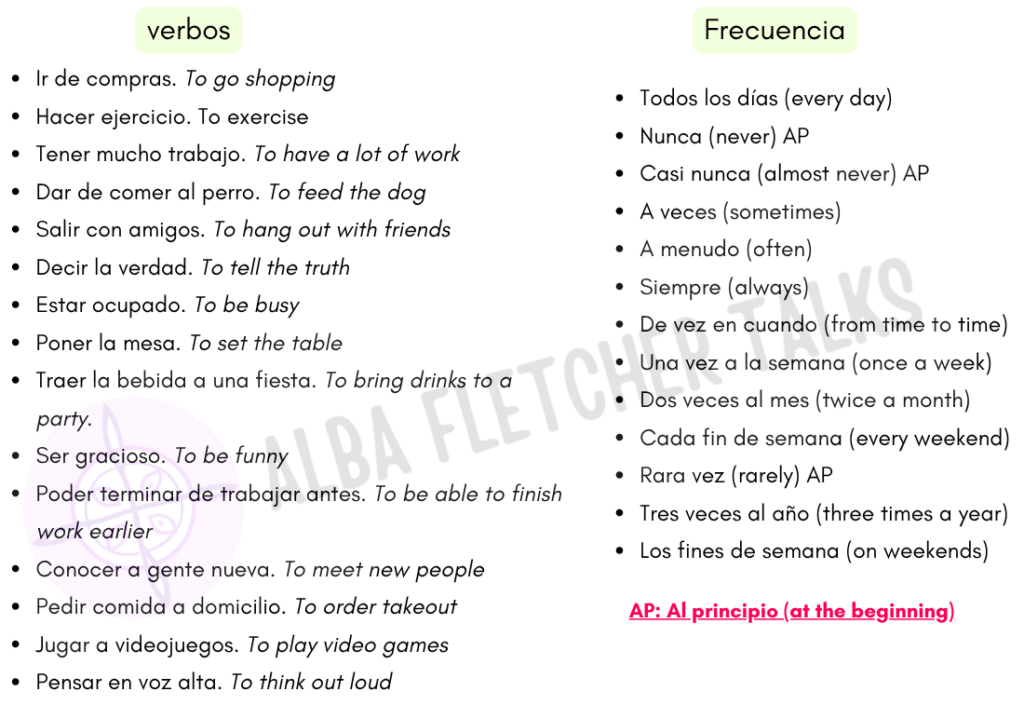

¿Con qué frecuencia haces ejercicio?
Hago ejercicio cuatro veces a la semana. Voy al gimnasio y cada día entreno una parte del cuerpo. Por ejemplo, los lunes entreno piernas, los martes entreno brazos y espalda, los jueves glúteo, y los viernes abdominales.
¿Con qué frecuencia sales con tus amigos?
Pues depende de la semana, pero normalmente salgo con mis amigos tres veces a la semana. Los miércoles siempre quedamos para tomar algo y durante el fin de semana hacemos alguna actividad como hacer una ruta de senderismo o jugar al pádel.
¿Cón qué frencuencias sales de trabajar antes?
Pues siempre salgo de trabajar a mi hora. No hacemos horas extras, sólo los días que hay alguna urgencia, pero en general no tenemos que hacer horas extras.
¿Con qué frecuencia pides comida a domicilio?
Pues la verdad es que normalmente no pedimos comida a domicilio. Nos gustar ir al restaurante y comer allí para desconectar del trabajo y de la rutina.
¿Con qué frecuencia juegas a videojuegos?
No juego mucho a videojuegos, sólo cuando mi sobrino nos visita, que entonces jugamos pues al FIFA o al videojuego de Spiderman. Pero cuando estoy solo o con mi pareja, no solemos jugar.
Una vez tengas claro la primera persona (yo) puedes continuar con las siguientes personas.
Por ejemplo: Mi padre piensa en voz alta todo el tiempo.
¿Tú siempre vas al mercado local? ¿Cuántas veces das de comer a tu perro? ¿Cón qué frecuencia pides comida a domicilio? ¿Con qué frecuencia tu hermano juega a videojuegos?
Once you have the first person (I) clear, you can continue with the following ones.
For example: My father always calls his parents.
Do you always go to the local market? How often do you feed your dog? How often do you order food from home? How often does your brother play video games?

